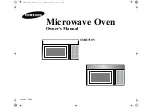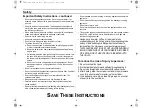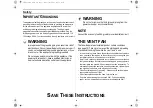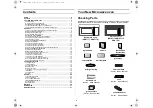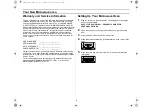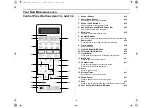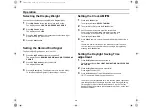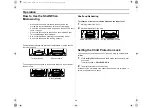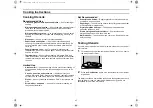
3
S
AVE
T
HESE
I
NSTRUCTIONS
Safety
Important Safety Instructions, continued
• Do not store this appliance outdoors. Do not use near water – for
example, near a kitchen sink, in a wet basement, or near a swimming
pool, etc.
• Keep the inside of the oven clean. Food particles or spattered oils
stuck to the oven walls or floor can cause paint damage and reduce
the efficiency of the oven.
• When cleaning door and oven surfaces, use only mild, nonabrasive
soaps or detergents applied with a sponge or soft cloth.
• Do not immerse cord or plug in water.
• Keep cord away from heated surfaces.
• Do not let cord hang over edge of table or counter.
• To reduce the risk of fire in the oven:
a. Do not overcook food. Watch appliance carefully if paper, plastic,
or other combustible materials are inside.
b. Remove wire twist-ties from plastic cooking bags before placing
bags in oven.
c. If materials inside the oven ignite, keep the oven door closed, turn
the oven off, disconnect the power cord, or shut off the power at
the fuse or circuit breaker panel. If the door is opened, the fire may
spread.
d. Do not use the oven compartment for storage purposes. Do not
leave paper products, cooking utensils, or food in the oven when
not in use.
• Do not try to preheat oven or operate while empty.
• Do not cook without the glass tray in place on the oven floor. Food will
not cook properly without the tray.
• Do not defrost frozen beverages in narrow-necked bottles. The
containers can break.
• Dishes and containers can become hot. Handle with care.
• Carefully remove container coverings, directing steam away from
hands and face.
• Remove lids from baby food before heating. After heating baby food,
stir well and test temperature by tasting before serving.
• Do not operate any other heating or cooking appliance beneath this
appliance.
• Do not mount unit over or near any portion of a heating or cooking
appliance.
• Do not mount over a sink.
• Do not store anything directly on top of the appliance when it is in
operation.
• This over-the-range oven was designed for use over ranges no wider
than 91.44 cm(36 inches). It may be installed over both gas and
electric cooking equipment.
• Liquids, such as water, coffee, or tea are able to be
overheated beyond the boiling point without appearing to be
boiling. Visible bubbling or boiling when the container is
removed from the microwave oven is not always present.
THIS COULD RESULT IN VERY HOT LIQUIDS SUDDENLY
BOILING OVER WHEN THE CONTAINER IS DISTURBED
OR A SPOON OR OTHER UTENSIL IS INSERTED INTO
THE LIQUID.
To reduce the risk of injury to persons:
1. Do not overheat the liquid.
2. Stir the liquid both before and halfway through heating it.
3. Do not use straight-sided containers with narrow necks.
4. After heating, allow the container to stand in the microwave
oven for a short time before removing the container.
5. Use extreme care when inserting a spoon or other
utensil into the container.
SMH7174STD DE68-.fm Page 3 Monday, March 28, 2005 9:18 AM

